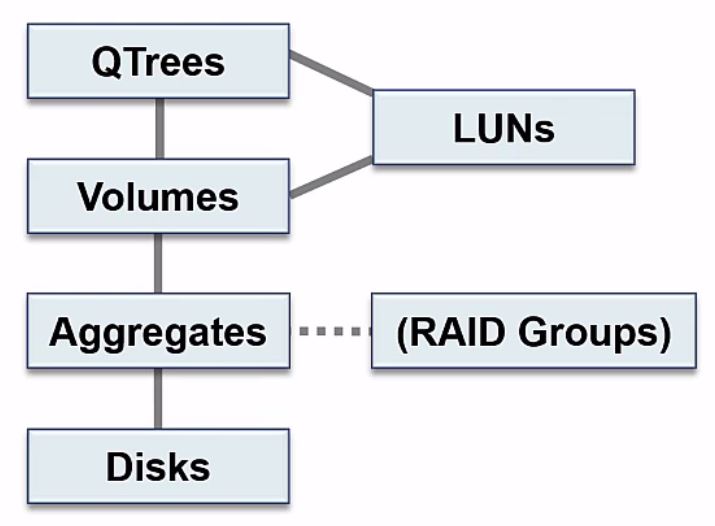
The acronyms CIFS (Common Internet File System) and SMB (Server Message Block) are both used as meaning the same thing in most of the NetApp documentation, but they’re not exactly the same thing. SMB was developed by IBM, and CIFS is a particular implementation of SMB which was developed by Microsoft.
NetApp Filer is the storage system product made by NetApp. It can serve as storage over the systems using networks such as FTP, NFS, SMB. It can also serve data over block-based protocol FCP, FCoE, and the likes. The Product is also called NetApp Fabric attaches storage or NetApp All Flash FAS.
Internal Architecture
At the bottom block of the storage architecture, we have physical disks - our hard drives. the disks get grouped into aggregates, so the aggregate is a set of physical disks. One of the attributes of our aggregates is the RAID group which defines the RAID configuration. The next block we have is our volumes. You could have multiple volumes in the same aggregate, or maybe just one volume in the aggregate. The next block above volumes, we have our Qtrees which go in volumes. Qtrees are an optional component. If the containing volume is being accessed by a NAS client. The last component we have in the storage architecture is our LUNs, our Logical Unit Numbers. A LUN is specific to SAN protocols and is the storage container that SAN clients use for their storage.

You can see the different components build on top of each other. We need to have our physical disks. Our disks get grouped into aggregates. For our clients to be able to access data we configure our volumes, which go in our aggregates, and optionally we can configure Qtrees that go in our volumes and appear as a directory to NAS clients. Lastly, if we're using SAN protocols we'll need to configure LUNs. Our LUNs either go into a Qtree or into a volume.
Snapshot and Backups
The NetApp filesystem provides a convenient way to recover files that have been accidentally deleted or otherwise damaged, within a short time frame - a system referred to as "snapshots". File recovery becomes a simple copy procedure on the current filesystem, avoiding the need to contact support personnel for tape recovery and the hassle of time delays caused by the relatively slow speed of tape drives and the necessity of Systems Administration hands-on interaction. In addition to the local snapshots, a second filer keeps disk-to-disk copies of our primary filer. Backups are currently done at least daily and as often as every hour depending on the load it puts on our file server; however, snapshots are only kept on a monthly basis on the backup filer.
How Can FileCloud Help?
NetApp Filer/FAS is a family of highly scalable, network-attached storage (NAS) appliances from NetApp. NetApp Filers are high-performance, scalable storage products used by large enterprises. Many organizations use the NetApp FAS appliances to store documents and files and make it available as network shares via LAN. They are typically exposed as CIFS or NFS shares in LAN and offer low latency access to large files.
FileCloud can help employees working from home access enterprise file shares stored in any Netapp Filer system. Users can receive seamless access to all files without using a VPN. FileCloud also integrates with all of your organization’s existing IT systems (AD, NTFS, and storage appliances such as NetApp FAS) while remaining completely affordable, so that your investment into remote work for your team is minimal with great results. With FileCloud, no migration of files and NTFS permissions is required, saving massive amounts of work and time.

FileCloud Benefits
- Secure, remote file share access without VPN -- using your Windows file shares
- Integrates with Active Directory
- 100% native Windows file-sharing and NTFS security integrations
- Mapped drive and mobile apps
- Built-in ransomware and anti-virus protection
- Smart Data Leak Prevention (DLP) and content classification capabilities
- Powerful audit trail and remote device management
- Help companies meet their security requirements & compliance standards such as FINRA, ITAR, FEDRAMP, HIPAA, and GDPR
- Use existing IT infrastructure – maximize ROI

By Team FileCloud